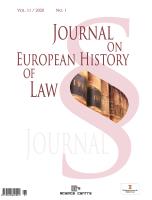The Human Rights, Canonic Law and the Impact of Religion from the Perspective of Vatican II
The Human Rights, Canonic Law and the Impact of Religion from the Perspective of Vatican II
Author(s): Jiří BílýSubject(s): History, Law, Constitution, Jurisprudence, Theology and Religion
Published by: Evropská společnost pro právní dějiny, z.s.
Keywords: human rights; religious liberty; theology; church; state; lumen gentium; dignitatis humanae; gaudium et spes; Codex iuris canonici; United Nations.
Summary/Abstract: Vatican II wanted to achieve its human rights updating objective. With this in mind, the article addresses three issues. The first concerns political democracy and the separation of the Church and the State as two conditions for the development of human rights. On this point, GS developed a compromise by starting, on one side, by affirming the divine foundation of the state, and on the other, by leaving the choice of political structure and the election of the rulers to the free will of the citizens. The second question concerns the right to religious freedom. It is the right to freedom to change religion or to have no religion. What is missing in DH, while present in the Universal Declaration of Human Rights, drafted in 1948 by the United Nations, is the right to freedom to change religion or not to have religion. This absence is probably due to the fact that the second part of DH deals with an act of faith (actus fidei) as a search for the truth - the truth of God that underlies religion - and does not present religion from public reason. The third issue is the question of human rights in the Church. It must be made clear that the fundamental rights enjoyed by ordinary members of the Church, according to the Code of Canon Law, inspired by GS, do not deserve this name. In the context of human rights laws, they are based on the irreducible values of human dignity, freedom and justice. Nevertheless, the canons of the Canon Law Code limit these rights by asserting that their application must contribute to the common good, and adding that it is ecclesiastical authority that is competent to interpret the common good, and, therefore, to regulate these rights.
Journal: Journal on European History of Law
- Issue Year: 11/2020
- Issue No: 1
- Page Range: 182-187
- Page Count: 6
- Language: Estonian

